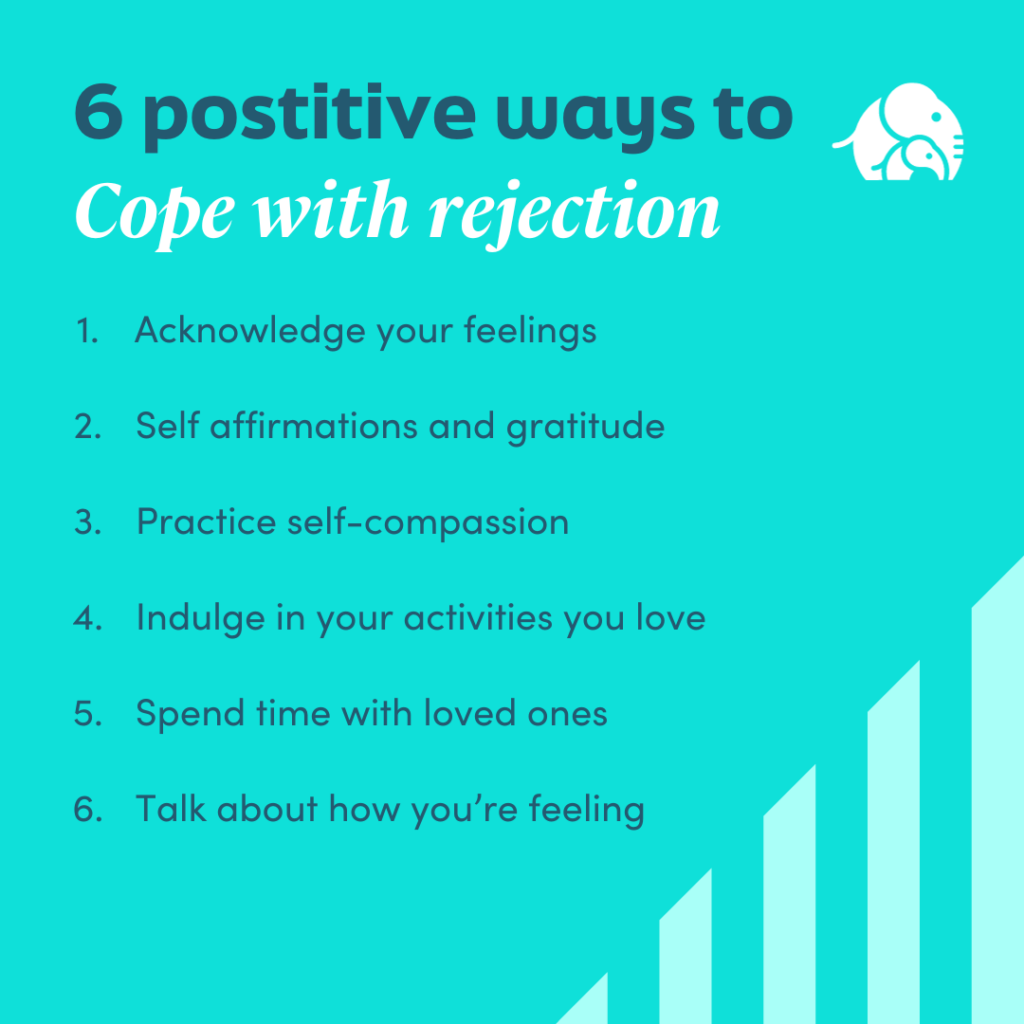Rejection can hurt – whether you were rejected by your crush, a friend, or a romantic partner. When you’ve been rejected, it’s easy to look at yourself as the problem and think through the “if onlys.”
If only I was smarter, prettier, stronger, funnier, more successful, braver, or less awkward…
And when you’re rejected in a relationship, the loneliness that comes after can feel unbearable. So how do you pick up the pieces of your broken heart and move onward? In this blog we’ll discuss how you can care for yourself, reflect, reframe your mindset, process your emotions, reaffirm your self-worth, and learn to try again.
Rejection got you down in the dumps? Get matched with your perfect therapist today.
Why Does Rejection Hurt So Much?
Rejection hurts because people – even the most introverted or self-sufficient of us – long for human connection. At our cores, we want to be accepted, cherished, respected, appreciated, and loved. However, the harsh reality is that no one can be accepted by everyone. Even the most successful and popular humans deal with their fair share of scrutiny, criticism, and rejection.
And no, you’re not overly sensitive or weak if you feel like a forgotten avocado that’s been left in the fridge to rot. Rejection can make you feel completely awkward, unlovable, and unworthy. And at the end of it all, even after all the pain rejection has made you feel, you might find that you still long for the acceptance of the person who rejected you.
How Does Relationship Rejection Impact Your Life?
Being rejected by someone you love can make you feel completely awkward, unlovable, and unworthy. It can have a deep, lasting impact on how you view yourself and others. Even after all the pain rejection has made you feel, you might find that you still long for the acceptance of the person who rejected you.Here’s a few of the ways rejection in relationships can cause long-term hurt:
Rejection Can Lower Your Self-Worth
It’s easy to see how rejection can make you feel bad about yourself. If the people you care about want nothing to do with you, then the issue must be you – right?
Wrong. People have many reasons for rejecting someone, and it might have nothing to do with your shortcomings. And sure, you might not have measured up to that individual’s wants or expectations, but their opinion is just that – an opinion.
It’s important to understand that rejection is often more about the rejecter than the rejectee. Sometimes, people who struggle with commitment or are struggling with their own mental health issues will reject others when they feel they are starting to get too close. They may be trying to save themselves from heartbreak. So maybe the time-old saying “it’s not you, it’s me” has more truth to it than you (and the person saying it) might even realize.
Rejection can also lead to a trauma response when triggered. Mood tracking for trauma triggers can be a great way to understand these triggers and how to navigate them.
Rejection Can Cause Anxiety
If rejection has had a deep impact on your mental wellbeing, it stands to reason you’ll want to do whatever you can to avoid feeling that way again. A fear of being rejected can cause anxiety in many areas. You might become more socially anxious and avoid putting yourself out there and making new friends. You may stop giving your opinion, attempting new things, applying for a new job, or doing anything out of your comfort zone because you fear you might make a mistake, make a fool of yourself, displease others, or be rejected once again.
Rejection Can Impact Future Relationships
Past rejection can make you jealous, distrustful, or distant in future relationships. Rejection anxiety can cause you to be constantly on the look out that your partner is showing signs of leaving. You might develop unhealthy attachment patterns.
You might feel very insecure in the relationship and find you change your behaviors, avoid certain conversations, or put your needs last to avoid rejection. And you might feel emotionally dependent on your partner, looking to them to validate your worth and fill your time.
On the other hand, you might feel you become distant and unavailable in future relationships – or you might avoid intimate relationships completely. You might become detached, put up walls, or leave a relationship to avoid being rejected.
Rejection Can Feel a Lot Like Grief
When you’ve been rejected by someone, you’ve lost someone who is important to you and you’ll likely need time to grieve. If you were rejected by a crush or a romantic partner, not only are you likely feeling pretty bad about yourself, but you’re also having to come to terms with the loss of that person from your life. The same is true for rejection from a friend or even a work opportunity – it can be hard to part ways with a dream, goal, or person you hoped for a future with.
Rejection Can Make You Feel Lonely
Rejection can make you feel utterly alone. If you begin to put up walls or think badly of yourself, this can only compound your loneliness. You might withdraw from your loved ones and avoid building close relationships with others. You might feel stuck in your own head and struggle with a tornado of painful thoughts and emotions. You might blame yourself for the rejection and think you’re the defective one, or you might become angry at the world.
How to Cope With Rejection

So what can you do when you’re in the throes of rejection? As you can see, being rejected isn’t just something you can brush off. You can’t just “suck it up” and assume the pain, anxiety, grief, and loneliness will just go away.
No matter what we tell ourselves, everyone wants deep, satisfying relationships – whether that’s with a close friend or a romantic partner. This is why it’s so essential to reflect on the rejection and openly address how it’s made you feel – rather than brush it aside and move on.
Here are some healthy ways you can deal with rejection:
1. Acknowledge Your Feelings
Accept how the rejection has made you feel. Take time to reflect on the situation and accept what happened. Consider journaling, mood tracking, or talking through the situation with someone you trust.
2. Practice Self-Affirmations and Gratitude
Remember the amazing BA that you are. List some of the things you love about yourself – even if it feels weird. Self-affirmations can be statements like “I am a creative and passionate person.” Or “I am a loyal friend.” And take some time to reflect on the things you’re grateful for.
3. Practice Self-Compassion
Sometimes one of the hardest things about being rejected is thinking back on the things you could have done differently. Maybe you said something cringy or didn’t express your emotions in quite the right way. If you’re keeping a track record of everything you shouldn’t have done or could have done better, have some grace and compassion with yourself. No one is perfect, and you can’t expect yourself to be. Learn to forgive yourself and come to peace with your past actions.
4. Focus on Activities you Enjoy
Understand that dealing with rejection is hard and you deserve to show yourself a little extra love during this time. Remember your goals, your passions, and your hobbies. Practice self-care and indulge yourself with your favorite activities. Find therapeutic activities that allow you to express yourself, decompress, and heal. Art, exercise, music, writing, and getting outdoors are all great options.
5. Spend Time With Loved Ones
After being rejected, your first instinct might be to hide away and dwell in a self-made shell of sorrow. However, surrounding yourself with the people you’re closest with can remind you that you’re valued and that you have some amazing people in your circle. You don’t even need to talk about the rejection if you don’t want to – just being in the presence of others who accept and see the best in you can help you remember your worth.
6. Talk About How You’re Feeling
An outside perspective can be valuable in the face of rejection. Living in your own head can be isolating. Getting it out in the open and talking through the situation with someone you can trust can take a huge weight off your shoulders. A therapist can provide valuable insight and help you process the event and work toward healthy attachment and relationship building.
Things to Avoid When Dealing with Rejection
- Obsessing over changing the person’s mind
- Thinking you need to change yourself to be accepted
- Beating yourself down or blame yourself for the outcome
- Overanalyzing the situation
- Withdrawing from loved ones
- Ignoring how you feel and “suck it up”
- Committing to never trying again
Looking for more resources to improve your relationships? Check out our list of 10 relationship books we recommend.
Next Steps: Moving on and Trying Again
So what does life after rejection look like? To pave a healthy path onward, you need to be aware of rejection’s impact on your life and be intentional in moving your healing forward. It’s also important to understand that your response to rejection is tied to other factors – events from your childhood, past trauma, your attachment style, or an existing mental health condition can all affect how severely rejection impacts you.
If you’re struggling to move forward and are struggling with building a strong relationship following a rejection, a therapist can help you identify negative patterns that are holding you back. This can look like individual therapy, where you’ll unpack how you’re feeling one-on-one with a therapist. Or, if you’re currently struggling in a relationship, couples counseling can help you understand how a fear of rejection or other factors is getting in the way of true intimacy and connection.
Ellie Mental Health is here to help you find a therapist that’s just right for you so you can get unstuck, get treatment for mental health issues like depression or anxiety, build emotional resilience, and develop strong relationships built on a foundation of intimacy and trust.
Ready to find a therapist you can vibe with in a city near you? Get started on your healing journey today.


